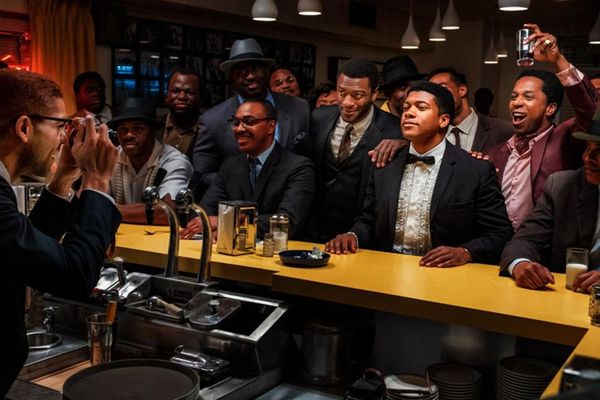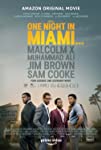Eye For Film >> Movies >> One Night In Miami (2020) Film Review
One Night In Miami
Reviewed by: Jennie Kermode

Muhammad Ali, Malcolm X, Sam Cooke and Jim Brown: four iconic figures, one hotel room, one long night of conversation. Though it isn't well known, this night actually happened. We don't know what they said there or to what degree it influenced their future decisions, but it's hard to imagine that its impact was small, especially in light of what was happening in their lives at the time. In this film, Kemp Powers explores what might have happened whilst director Regina King manages to deliver a lot more in this restricted setting than you might expect.
It's the 25th of February 1964, and Ali (Eli Goree) - then still going by Cassius Clay, or Cass to his older companions - has just beaten Sonny Liston to become Heavyweight Champion of the World. Just 22 and adorably full of himself, he's ready to celebrate, but not in a way that his friend and mentor Malcolm (Kingsley Ben-Adir) would disapprove of. The two discuss Cass' plans to publicly announce his conversion to Islam, and the uncertainties that anyone would be wary about at such a pivotal time. At Malcolm's instigation, they're joined by Sam (Leslie Odom Jr) and Jim (Aldis Hodge), and it becomes clear that the civil rights campaigner intends to give them all some direction regarding the parts they can play in the movement and their duty to do so. Sam is having none of it; he wants to be someplace that has drink and women. Both friendship and argument keep the men together as they discuss politics, religion, money and the balance of obligations that they feel to themselves and to other African Americans.

There's a shadow over the night, of course, because we know that the cause that Malcolm speaks about so passionately will cost him his life in just under a year, but Ben-Adir's performance draws out tragic aspects of his character even without this. The frustration he feels with others' refusal to commit as he has done is a reflection of the intense responsibility he feels, which is plainly exhausting him. Despite being the youngest, Cass seems the most alert to this, and in their different ways they are protective of each other. Cooke, of course, is also facing an early death, but captured here at the height of his career he has no inkling of it, none of the presentiment that seems to haunt Malcolm. in Powers' story, he doesn't understand why he needs to be political to make a difference, instead stressing what he has achieved by becoming famous and supporting other black artists.
The fourth member of the group (and the only one still alive at the time of writing), Brown is also at a pivotal point in his life. His sporting career is coming to an end and he's thinking of trying to make it as an actor. Perhaps it's the empathy required in that profession that makes him more inclined to set aside his ego and try to see where the others are coming from, brokering some kind of peace. He has his own arguments to make but his different communication style makes them less obvious. He's the everyman who gives us access to the rest.
A prologue, a brief epilogue and occasional ventures made into the outside world in search of food and drink give us glimpses of the wider context within which these men exist. Everybody loves Cass, the conquering hero, who at this stage in his life exudes friendliness even in the face of injustice. The ubiquity of racism makes itself known not through confrontation but in incidents all the more awful for their easiness, their normality in the eyes of white characters. Exclusion squanders talent and acts as a reminder that little has changed in this mindset since the days of slavery. Constantly treated as if they were less than human, the four use one another as a means through which to define their status as real people and as men.
There are no weak links in the performances here, but Ben-Adir is the standout, communicating most in the moments when he doesn't say a word. Goree, meanwhile, builds on the promise he has shown on the small screen and shows himself more than ready for a film career. King balances her cast with precision, inviting viewers to shift their sympathies as the night goes on but to come out with a deeper appreciation of who these icons were as human beings. The result is a film as powerful as it is necessary, and not to be missed.
Reviewed on: 20 Jan 2021















